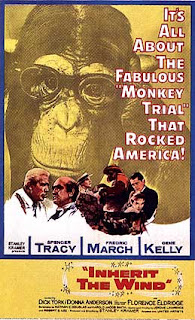Inherit the Wind
 1960 had the requisite Stanley Kramer message picture--Inherit the Wind, which was based on a hit play by Jerome Lawrence and Robert E. Lee. Loosely based on the Scopes "Monkey" Trial of 1925, it was fictionalized and skewed into an attack on McCarthyism. Though it has some fine acting, it's something of a relic now, though easy to watch.
1960 had the requisite Stanley Kramer message picture--Inherit the Wind, which was based on a hit play by Jerome Lawrence and Robert E. Lee. Loosely based on the Scopes "Monkey" Trial of 1925, it was fictionalized and skewed into an attack on McCarthyism. Though it has some fine acting, it's something of a relic now, though easy to watch.In this telling, a high school biology teacher in a southern town (the real town was Dayton, Tennessee), Bert Cates (Dick York) teaches evolution, a violation of state law. He is arrested and brought to trial, which makes the town both heroic to the religiously zealous and a laughing-stock to big cities. A reporter for the Baltimore paper (played by Gene Kelly and based on H.L. Mencken) recruits the country's most famous advocate, Henry Drummond (a stand-in for Clarence Darrow, and played by Spencer Tracy). Volunteering to prosecute is Matthew Harrison Brady (substituting for William Jennings Bryan and played by Fredric March), a populist politician (he lost presidential races three times) and firm believer in the literal truth of the Bible.
As I read about the events of the real trial, I was interested to see how the film differed. Scopes violated the law (although he wasn't sure he really did teach evolution) as a test-case sponsored by the ACLU. Darrow and Bryan were only parts of large teams of lawyers. The ACLU is never mentioned in the film. I'm not sure if the friendship between Drummond and Brady--it seems the former campaigned for the latter--was based on truth, but it does give an appreciated bit of complexity and creates a welcome gray area.
The problem with the film is that it feels like preaching to the converted. The religious are made out as cardboard villains, which is pretty easy. The truth of evolution is never really pinned down (the judge, Harry Morgan, wouldn't allow any of Drummond's expert witnesses), as I believe Lawrence and Lee considered that settled matter by the 1950s, and were interested in making a statement about freedom of thought, which had been so shattered by the Red Scare. They might be amazed that evolution is once again a subject for debate, when almost all Republican presidential candidates say they don't believe in it. What would Clarence Darrow have made of intelligent design?
The film's big moment is when Drummond puts Brady on the stand as an expert witness on the Bible, which amazingly really happened. This is like going to a concert and waiting for the band's big hit, and when it comes you stand and dance. Tracy and March were both well on in years, but they had lost none of their power, and Tracy milks his talent for all its worth, as he attempts to show how the Bible can't really be literally true--how do you measure a day, when there is no sun? Where did Cain's wife come from? March, although wearing some unfortunate makeup, stands toe to toe with him, but as in real life, the exchange kills him (Bryan died a few days after the trial ended).
Many of the other scenes in the film creak with artificiality, particularly those involving York's fiancee, who is also the daughter of the fire-and-brimstone town minister. In a perfect world, this film would be notable only for Tracy's fine performance, but sadly, it still needs to be seen by some people. Evolution, people, is a fact, not a theory.


Comments
Post a Comment